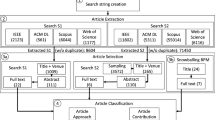Abstract
The primary objective of all software engineering courses is to help students learn how to develop successful software systems with good software engineering practices. Various tools and guidelines are used to assist students to gain the knowledge as much as possible. USC’s Center for Systems and Software Engineering (CSSE) has found that the keystone course in learning software engineering is a year-long real-client team project course. Over the last ten years, CSSE has evolved a set of guidelines for the course, and has experimented with early tests for creating electronic process guides for MBASE (Model-Based (Systems) Architecting and Software Engineering) Guidelines using Spearmint/EPG. Currently, CSSE has been developing and experimenting with Eclipse Process Framework’s (EPF) to situate the LeanMBASE Guidelines. This paper reports our comparative experiences of using the earlier and current tools to generate the electronic process guidelines. In our analysis, we used the objectives defined by Humphrey and Kellner[17] to compare the process tools. The evaluation identifies some research challenges and areas for future research work.
Preview
Unable to display preview. Download preview PDF.
Similar content being viewed by others
References
Abts, C., Boehm, B., Clark, B.: COCOTS: a COTS software integration cost model. In: Proceedings ESCOM-SCOPE 2000 Conference (2000)
Becker, U., et al.: MVP-E: A Process Modeling Environment. IEEE TCSE Software Process Newsletter 10, 10–15 (1997)
Becker, U., Hamann, D.: Support for the Process Engineer: The Spearmint Approach to Software Process Definition and Process Guidance. In: Jarke, M., Oberweis, A. (eds.) CAiSE 1999. LNCS, vol. 1626, pp. 119–133. Springer, Heidelberg (1999)
Becker, U., Verlage, M.: The V-Modell Guide: Experience with a web-based approach for process support. In: Proceedings of Software Technology and Engineering Practice 99 (1999)
Becker, U., Scott, L., Zettel, J.: Process engineering with SpearmintTM/EPG. In: Proceedings of the 22nd International Conference on Software Engineering, pp. 791–792 (2000)
Boehm, B.: Anchoring the Software Process. IEEE Software, 73–82 (July 1996)
Boehm, B.: Software Risk Management: Principles and Practices. IEEE Software, 32–41 (January 1991)
Boehm, B., et al.: Software Cost Estimation with Cocomo II. Prentice-Hall, Englewood Cliffs (July 2000)
Boehm, B., Grünbacher, P., Briggs, B.: Developing Groupware for Requirements Negotiation: Lessons Learned. IEEE Software, 46–55 (May/June 2001)
Boehm, B., Port, D.: Escaping the Software Tar Pit: Model Clashes and How to Avoid Them. ACM Software Engineering Notes, 36–48 (January 1999)
Boehm, B., et al.: Guidelines for the Life Cycle Objectives (LCO) and the Life Cycle Architecture (LCA) deliverables for Model-Based Architecting and Software Engineering (MBASE). USC Technical Report (1998)
Boehm, B., et al.: The MBASE Life Cycle Architecture Milestone Package: No Architecture is An Island. In: First Working IFIP Conference on Software Architecture (WICSA’1) (1998)
Boehm, B., et al.: Using the WinWin Spiral Model: A Case Study. IEEE Computer, 33–44 (July 1998)
Booch, G., Rumbaugh, J., Jacobson, I.: The Unified Modeling Language User Guide. Addison-Wesley, Reading (1999)
Haumer, P.: Eclipse Process Framework Composer Part 1 and 2. User Documentation, http://www.eclipse.org/epf/general/getting_started.php
Haumer, P.: Increasing Development Knowledge with EPFC. Eclipse Review 1(2), 26–33 (2006)
Humphrey, W., Kellner, M.: Software Process Modeling: Principles of Entity Process Models. In: Proceedings of the 11th International Conference on Software Engineering, PA, USA, pp. 331–342 (1989)
IBM Rationale Portfolio Manager, http://www-306.ibm.com/software/awdtools/portfolio/index.html
Kellner, M.: Software process modeling support for management planning and control. In: Dowson, M. (ed.) Proceedings of the First International Conference on the Software Process, August 1991, pp. 8–28. IEEE Computer Society Press, Los Alamitos (1991)
Kellner, M., et al.: Process guides: Effective guidance for process participants. In: Proceedings of the Fifth International Conference on the Software Process, Chicago, IL, USA, June 1998, pp. 11–25. ISPA Press, Chicago (1998)
Kroll, P., Sand, P.: A Development Library at Your Fingertips. Eclipse Review 1(3), 25–28 (2006)
Kruchten, P.: The Rational Unified Process, 2nd edn. Addison-Wesley, Reading (2001)
MBASE Website, http://sunset.usc.edu/csse/research/mbase/
OpenUP/Basic – A Process for Small and Agile Projects. User Documentation, http://www.eclipse.org/epf/general/getting_started.php
Scott, L., et al.: An Evaluation of the Spearmint Approach to Software Process Modelling. In: Ambriola, V. (ed.) EWSPT 2001. LNCS, vol. 2077, pp. 77–89. Springer, Heidelberg (2001)
Scott, L., Jeffery, R., Becker-Kornstaedt, U.: Preliminary Results of an Industrial EPG Evaluation. In: 4th ICSE Workshop on Software Engineering over the Internet, pp. 55–58. IEEE Computer Society, Los Alamitos (2001)
UML Resource Page, http://www.uml.org/
USC Software Engineering Class I Website, http://greenbay.usc.edu/csci577/fall2006/site/index.html
Author information
Authors and Affiliations
Editor information
Rights and permissions
Copyright information
© 2007 Springer Berlin Heidelberg
About this paper
Cite this paper
Phongpaibul, M., Koolmanojwong, S., Lam, A., Boehm, B. (2007). Comparative Experiences with Electronic Process Guide Generator Tools. In: Wang, Q., Pfahl, D., Raffo, D.M. (eds) Software Process Dynamics and Agility. ICSP 2007. Lecture Notes in Computer Science, vol 4470. Springer, Berlin, Heidelberg. https://doi.org/10.1007/978-3-540-72426-1_6
Download citation
DOI: https://doi.org/10.1007/978-3-540-72426-1_6
Publisher Name: Springer, Berlin, Heidelberg
Print ISBN: 978-3-540-72425-4
Online ISBN: 978-3-540-72426-1
eBook Packages: Computer ScienceComputer Science (R0)




